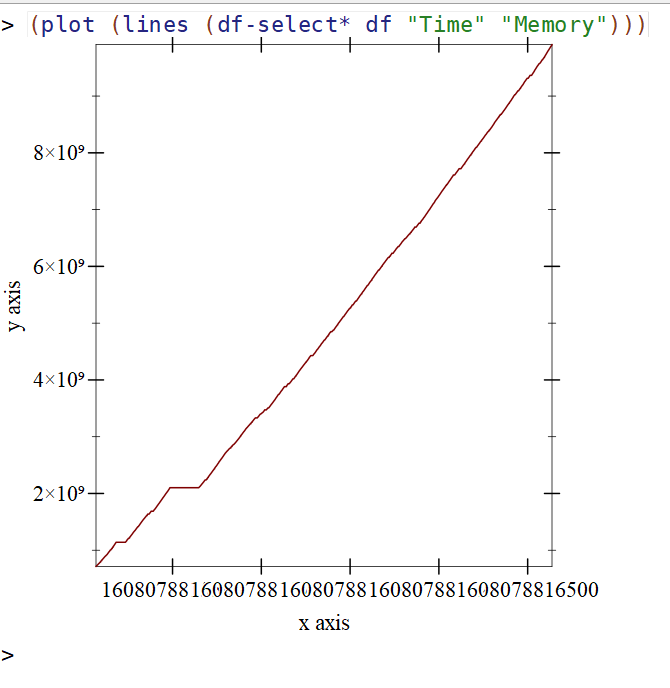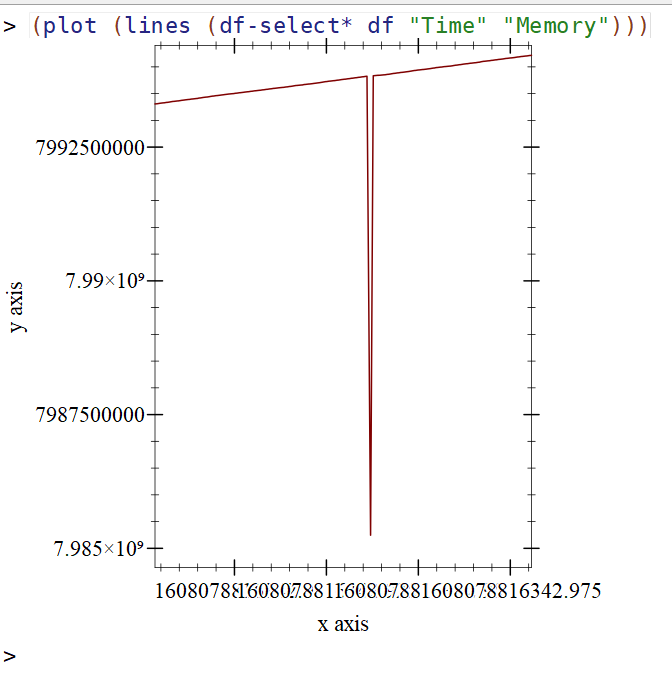Using current-process-memory with 'cumulative argument
34 views
Skip to first unread message
Alex Harsanyi
Dec 15, 2020, 8:00:42 PM12/15/20
to Racket Users
I am trying to use `(current-process-memory 'cumulative)` to determine the total memory used by an application, including the memory that was reclaimed by the garbage collector. I would expect the results from the call to be constantly increasing, and this is indeed the case at a "global" scale:

However, occasionally, there seems to be a drop in the reported memory use, as shown, if I zoom in the plot. The drops are about 8Mb each and there are about 20 of them for a program that makes 1 million calls.

At first, I thought this is a bug in the way I collect the data (and there might be a bug), but I can't seem to spot it, so I am wondering if my expectation is correct that `(current-process-memory 'cumulative)` will always report increasing results?
In case this is important, I am using Racket 7.9 CS on a Windows machine.
Thanks,
Alex.
Matthew Flatt
Dec 15, 2020, 9:11:25 PM12/15/20
to Alex Harsanyi, Racket Users
At Tue, 15 Dec 2020 17:00:42 -0800 (PST), Alex Harsanyi wrote:
> I am trying to use `(current-process-memory 'cumulative)` to determine the
> total memory used by an application, including the memory that was
> reclaimed by the garbage collector. I would expect the results from the
> call to be constantly increasing, and this is indeed the case at a "global"
> scale: [...]
> I am trying to use `(current-process-memory 'cumulative)` to determine the
> total memory used by an application, including the memory that was
> reclaimed by the garbage collector. I would expect the results from the
> call to be constantly increasing, and this is indeed the case at a "global"
>
> However, occasionally, there seems to be a drop in the reported memory use,
I'm able to replicate that with
> However, occasionally, there seems to be a drop in the reported memory use,
#lang racket
(define (work n)
(length (let loop ([n n])
(if (zero? n)
'()
(cons (make-vector n) (loop (sub1 n)))))))
(let loop ([u (current-memory-use 'cumulative)])
(work (random 1000))
(let ([u2 (current-memory-use 'cumulative)])
(if (u2 . < . u)
(error "oops")
(loop u2))))
which reports an error fairly quickly for me.
The implementation of
(current-process-memory 'cumulative)
is
(+ (bytes-deallocated) (bytes-allocated))
It's possible for a GC to happen at the start of the call to
`bytes-allocated`, which I think would produced the blip you see (i.e.,
there could be bytes not yet attributed to `bytes-deallocated`, but
they get shifted there before `bytes-allocated` runs).
The solution is make that arithmetic atomic with respect to a GC by
disabling signals around the arithmetic. I've pushed that change, and
my test program doesn't error anymore, at least.
Matthew
Alex Harsanyi
Dec 16, 2020, 7:36:42 AM12/16/20
to Racket Users
Thanks for providing the fix.
This is most likely the cause, as my own test program is essentially the same as yours, except that I collect the samples separately rather than checking for the memory decrease immediately.
Alex.
Reply all
Reply to author
Forward
0 new messages
